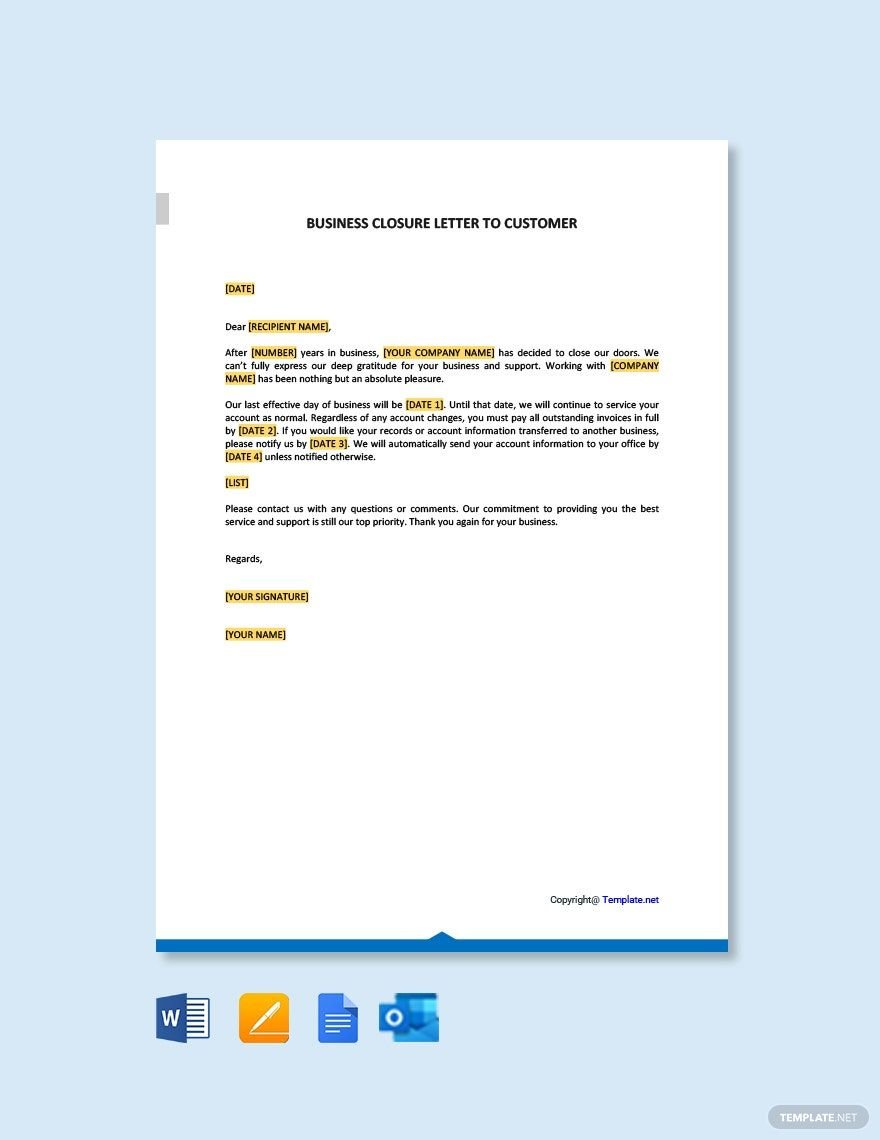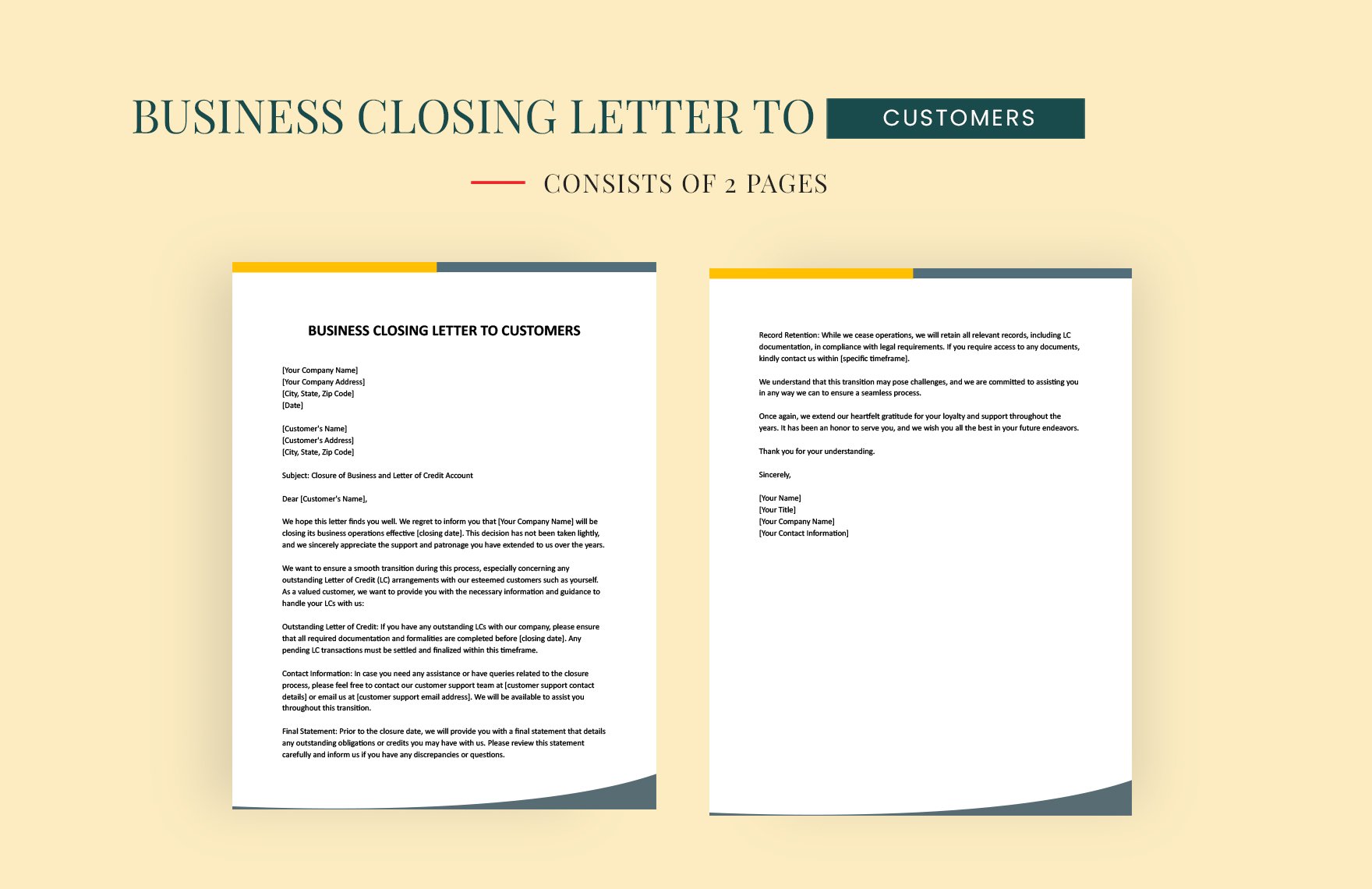Running a business is a rollercoaster ride filled with exhilarating highs and crushing lows. Sometimes, despite our best efforts, the curtain falls, and it’s time to bid farewell to our loyal customers. This is where a thoughtful and heartfelt closing letter can make all the difference. It’s not just about saying goodbye but about leaving a lasting impression, thanking for the journey, and ensuring we part ways on a positive note.

Image: www.template.net
A sample business closing letter to customers is more than just a formality; it’s a chance to show gratitude, offer transparency, and provide valuable guidance for those who have been with you on this journey. This article will delve into the key elements of crafting a closing letter that resonates with customers and leaves them feeling respected and understood.
The Importance of a Well-Crafted Closing Letter
In the world of business, closure is crucial. It’s not just about closing the doors or shutting down operations; it’s about closing the loop with those who have entrusted us with their patronage. A well-written closing letter serves several important purposes:
- Expressing Gratitude and Appreciation: Customers are the lifeblood of any business. A closing letter gives you the opportunity to express your sincere gratitude for their support, loyalty, and trust. It’s a chance to acknowledge their contribution to your journey and leave a positive note even in the midst of closure.
- Providing Transparency and Explanation: The closure of a business can raise questions and concerns among customers. Offering a transparent explanation of the reasons behind the closure, while remaining sensitive and respectful, fosters understanding and helps provide closure for them as well.
- Maintaining a Positive Image: Even in the face of challenging circumstances, a closing letter can be an opportunity to maintain a positive image and leave a lasting impression. By expressing gratitude and providing guidance, you can ensure that your customers remember your business favorably even after it’s gone.
- Providing Closure and Direction: Customers may be left wondering about their future options after your business closes. A closing letter can provide valuable guidance and direction, such as recommending alternative businesses or resources that can fulfill their needs.
Sample Closing Letter Template
While every business closing is unique, there is a basic structure that can serve as a template for crafting an effective letter:
Opening Paragraph
- Start with a warm and sincere salutation, acknowledging the importance of your customers. Example: “Dear Valued Customers,”
- State the purpose of the letter clearly and concisely. Example: “We are writing to inform you with a heavy heart that [Business Name] will be closing its doors on [Date].”
- Express gratitude for their support, loyalty, and trust. Example: “We are deeply grateful for your loyal patronage and the trust you have placed in [Business Name].”

Image: www.template.net
Body Paragraphs
- Offer a brief and transparent explanation of the reasons for closure, focusing on factors that are relevant and understandable to customers. Example: “This decision was not made lightly and is due to [Reason]. We have explored various options, but unfortunately, we were unable to find a sustainable path forward.”
- Express appreciation for specific contributions or memories, making the letter more personal and impactful. Example: “We will cherish the memories of [Specific Events or Achievements].”
- Provide guidance and direction for customers’ future needs, offering recommendations for alternative businesses or resources. Example: “We would like to recommend [Alternative Businesses] that offer similar services. We wish you the best in finding a suitable alternative.”
Closing Paragraph
- End with a sincere expression of gratitude, leaving the customer with positive feelings. Example: “Thank you again for your unwavering support. We will truly miss serving you.”
- Provide contact information for any final inquiries or arrangements. Example: “For any questions or concerns, please contact us at [Email/Phone Number].”
- End with a warm sign-off, reflecting the tone and nature of your business. Example: “Sincerely,” or “With deepest gratitude,”
Key Components of a Strong Closing Letter
Beyond the basic structure, consider these essential elements to make your closing letter truly resonate with customers:
1. Tone and Voice
The tone and voice of your letter should reflect the values and personality of your brand. While expressing gratitude and acknowledging sadness, maintain a professional and respectful tone. Avoid using overly emotional or apologetic language that might make the letter seem weak or insincere.
2. Clarity and Conciseness
Customers should be able to understand the message immediately and grasp the key takeaways. Use clear and concise language, avoiding jargon or overly complex phrasing. Break down the information into manageable paragraphs for easy readability.
3. Personalization
Wherever possible, personalize the letter to make it more impactful. Address customers by name, if possible, or refer to specific experiences or interactions that reflect your relationship with them. This personal touch demonstrates genuine care and consideration.
4. Offer of Assistance
Going beyond simply saying goodbye, offer practical assistance to your customers. This could involve directing them to alternative businesses, providing information about refund policies, or offering support in transitioning to new providers. This demonstrates your commitment to their well-being even after the closure.
5. Expression of Gratitude
A closing letter is ultimately a chance to say thank you. Acknowledge the role your customers played in your business journey and express your genuine gratitude for their loyalty and support. This sincere appreciation will leave a positive lasting impression, even in the midst of closure.
Examples of Sample Business Closing Letters
To illustrate these points, let’s look at some sample closing letters for different types of businesses:
Example 1: Small Retail Store
> Dear Valued Customers,
We are writing to inform you with a heavy heart that [Store Name] will be closing its doors on [Date]. This decision was not made lightly and is due to [Reason for Closure]. We have explored various options, but unfortunately, we were unable to find a sustainable path forward.
We are deeply grateful for your loyal patronage and the trust you have placed in [Store Name]. Your friendship and support have meant the world to us. We will cherish the memories of [Specific Events or Achievements], like the time when [Share a memorable story or event].
We would like to recommend [Alternative Businesses] that offer similar products or services. We wish you the best in finding a suitable alternative.
Thank you again for your unwavering support. We will truly miss serving you.
Sincerely,
[Your Name]
Example 2: Online Service Provider
> Dear [Customer Name],
This is a difficult message to write, but we’re reaching out to inform you that [Company Name] will be ceasing operations on [Date].
We truly appreciate your support and trust in our services. [Share a specific positive customer experience] was a moment we’ll always remember. We’ve made every effort to make this transition as smooth as possible for you, and we’re here to help in any way we can.
[Provide information about refunds or data migration processes]. We’ve also compiled a list of alternative service providers that you might find beneficial: [List of Alternative Service Providers].
Thank you again for being a part of the [Company Name] journey. We wish you all the best.
Sincerely,
[Your Name]
Beyond the Letter: Maintaining a Positive Image
While a well-written closing letter is important, it’s just one piece of the puzzle. Here are some additional strategies for ensuring a positive image and leaving a lasting impression:
- Be Transparent: Communicate the reasons for closure clearly and honestly. Avoid hiding behind vague statements or making promises you can’t keep.
- Acknowledge Emotions: It’s okay to be heartfelt and acknowledge the sadness of closure for both you and your customers. This shows empathy and humanizes your brand.
- Offer a Farewell Gesture: Consider a small gesture of appreciation, such as a discount on remaining inventory, a donation to charity in your customers’ names, or a personalized thank-you note.
- Maintain Online Presence: Even after closure, keep your website and social media active. Provide updates on closure details, redirect customers to alternative resources, and respond to inquiries.
- Stay Connected: Keep in touch with customers through email updates, newsletters, or social media. This demonstrates your commitment to their needs even after your business journey has ended.
Sample Business Closing Letter To Customers
Conclusion
Saying goodbye is never easy, but a well-crafted closing letter can be a powerful tool for leaving a positive and lasting impression on your customers. By expressing gratitude, providing transparency, and offering guidance, you can ensure that your business is remembered favorably even after you’ve closed your doors. Remember, a thoughtful farewell is the final act of building a lasting relationship with your customers and creating a positive legacy for your brand.






